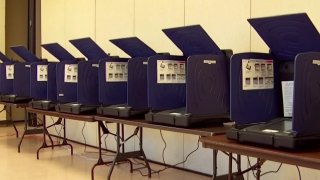
Massachusetts' presidential primary elections are just around the corner. But don't wait to think about voting until Election Day... It might be too late!
Whether you are a first-time voter or like many, just find elections confusing, the best thing is to create a plan ahead of time. Luckily, there are resources available to help voters do just that.
We've put together a guide to answer your questions about voting in the primary elections on March 3.
Am I Registered to Vote?
Massachusetts residents can check their voter registration status and register to vote online at the Secretary of State's website.
To vote in any Massachusetts election, you must be registered to vote 20 days before the election; that deadline was Feb. 12. If you missed the deadline to register to vote on Super Tuesday — when Massachusetts and 13 other states hold their Democratic primaries — you can still register to vote in Massachusetts' state-level primary in September and the general election in November.
I Can't Make It to the Polls on Election Day. Can I Still Vote?
Local
In-depth news coverage of the Greater Boston Area.
Any registered voter in Massachusetts has the option to vote early from Feb. 24 to 28. During that time, every town or city must have at least one location that voters can visit during normal business hours to vote early.
If you won't be in town on Election Day or have a physical disability or religious belief that prohibits you from going to the polls, you are eligible to vote absentee. Absentee ballots can be requested online from the Secretary of State’s website.
It Says I'm Registered to Vote, but I Don't Remember Registering
If you took part in any learner’s permit, license, ID transaction, MassHealth or Health Insurance processes on or after Jan. 1, you were automatically registered to vote. Massachusetts passed automatic voter registration in 2018 and it went into effect in 2020.
Now, residents must opt out during these processes if they don't want to be automatically registered. Anyone who is at least 16 years old can pre-register to vote.
How Can I Prepare for Election Day?
Set a reminder. TurboVote, an online service, sends reminders ahead of elections so that you never forget to vote.
Decide who or what you'll vote for. You can start reading up on the people and questions that will be on your ballot ahead of time. Vote411 is a free national service from the League of Women Voters Education Fund. They provide personalized ballot guides with information on the candidates running for office and where they stand on issues.
Find your polling place. In Massachusetts, polling places are required to be open from 7 a.m. to 8 p.m. Some polling places may choose to open as early as 5:45 a.m. Make a plan to get to the polls that works for your schedule.
What Are My Rights at the Polls?
Anyone standing in line when the polls close at 8 p.m. must be allowed to vote, according to the secretary of state.
If you are a first-time voter, an inactive voter, are vesting a provisional or challenged ballot or the poll worker has “reasonable suspicion that leads them to request identification,” you may be asked to show identification. A form of acceptable ID would include your name and the address you are registered to vote at. It does not need to be a photo ID.
If a poll workers say your name does not appear on the list of voters and your registration cannot be verified, you have the right to cast a provisional ballot. Provisional ballots allow you to vote while your voter eligibility is determined.
If you run into any issues while voting, you can contact the Election Protection hotline by calling 1-866-687-8683 for a trained English-speaking volunteer, 1-888-839-8682 for an Spanish -speaking volunteer, 1-888-274-8683 for an Asian-language-speaking volunteer or 1-844-925-5287 for an Arabic-speaking volunteer.
What Do I Do Once I'm in the Voting Booth?
When you get your ballot from the poll worker, it is important to read the directions on the ballot carefully. Depending on the ballot, you will need to mark an X after a candidate’s name, fill in an oval or use connecting arrows.
If you require assistance in marking your ballot due to a physical disability, inability to read or inability to read in English, you may bring someone of your choice into the voting booth with you. If you do not have someone to bring with you, you can ask a poll worker of the opposing party to assist you.
After marking your ballot, you must check out with a poll worker to confirm your name and address. After checking out, you can cast your ballot in the ballot box or via optical scan in the ballot machine.
Can I Take a Ballot Selfie?
There is no law in Massachusetts that explicitly says ballot selfies are illegal. However, Massachusetts General Laws state that anyone who shares their marked ballot with an unauthorized person may be subject to a fine or imprisonment.
So if you do take a selfie while voting, don't show your ballot.
Does My Vote Even Matter?
Just last year, a Boston City Council race was decided by a single vote. So yes, one person casting a ballot can influence the outcome of an election.
Why Don't People Vote?
People vote — but many only do it in certain elections. In 2016, Massachusetts had record turnout during the presidential general election, 74.5% of registered voters, according to the Secretary of State's office.
But that same year, only 8.8% of registered voters voted in the state primary.
To learn more about people's voting habits, we spoke with Juwonni Cottle, the Young Civic Leaders coordinator at MassVOTE, a nonpartisan, nonprofit organization that seeks to increase voter participation in Massachusetts.
“A lot of people think local elections don’t matter even though that’s where a lot of change happens in everyday life,” Cottle explained.
Policy on the local and state level, like the automatic voter registration implemented this year, can make a significant impact, according to Cottle.
But getting to the polls is a hurdle for many people, Cottle said. Despite working for an organization that works to expand civic engagement, he told NBC10 Boston that even he was unable to vote in a recent local election.
To Cottle, there are “so many steps we can take to get people access to their rights, because sometimes it can feel like a chore.”
MassVOTE works to pass any legislation that grows access to voting and the impact of votes, specifically aiming to turn out the vote of people of color, low-income people and new citizens in order to promote social, economic, environmental and racial justice.



